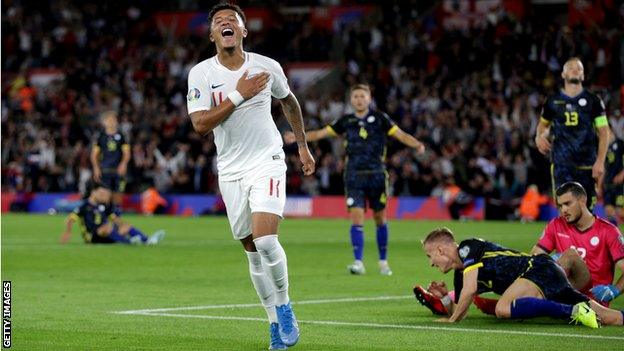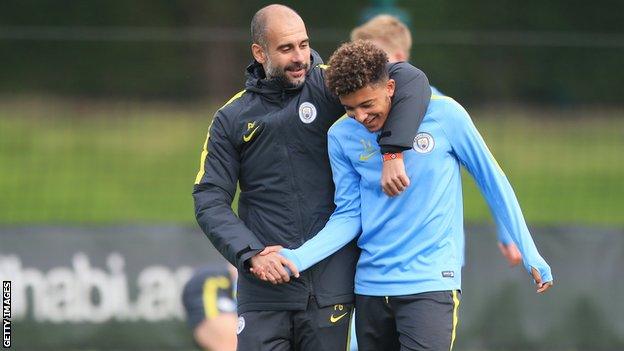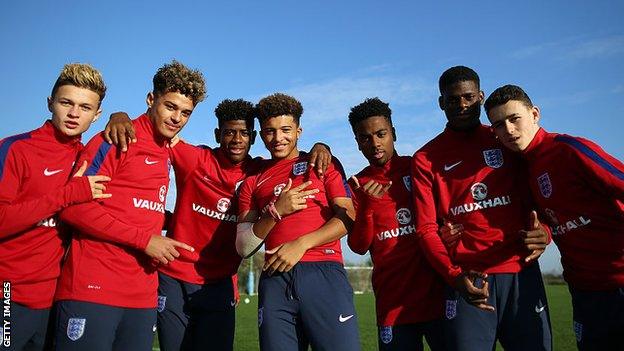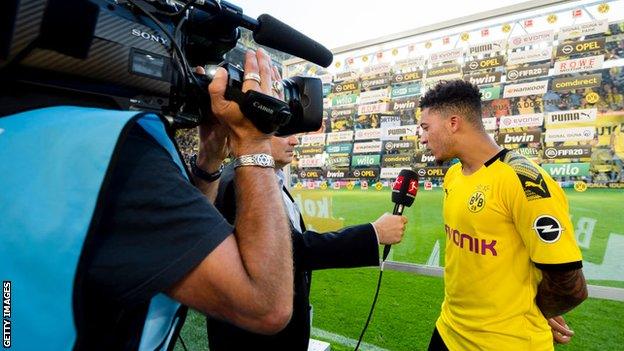Jadon Sancho: How single-minded schoolboy made his dream a reality
- Published
- comments


Jadon Sancho scored his first England goals when he struck twice against Kosovo in September
Jadon Sancho drops his schoolbag and sits down. His white shirt - sleeves rolled up and blazer discarded - hangs from his 14-year-old shoulders. His burgundy-and-gold tie is knotted loosely around his neck. He and his team-mates from Watford's under-15s have been excused from their classrooms and, one by one, called into one of the school's small upstairs offices.
Their coach, Louis Lancaster, is there to meet his players and discuss their ambitions. When asked what he wants from football, Sancho's reply comes without hesitation. "I want to play for England, and I want to play for one of Europe's top clubs," he says. "I want my family to be proud of me."
Aged 19, he has achieved all of those feats and his goal for Borussia Dortmund against Barcelona in the Nou Camp on Wednesday was his latest footballing landmark. Whether he has many more at the club remains to be seen, with reports suggesting he is set to leave in January after a falling-out over "disciplinary issues"., external He is, it seems, wanted by many of Europe's leading clubs.
Being at the centre of such a high-stakes transfer saga is a world away from the environment in which Sancho gained his earliest footballing education. That came in the cages - the all-weather sports courts - near his home in Kennington, south London. He was childhood friends with Arsenal's Reiss Nelson and Ian Carlo Poveda, who later became a Manchester City team-mate. He was spotted by Watford aged seven and would travel across London three nights a week to train with the Hornets until, at 11, he was old enough to attend the club's partner school, the Harefield Academy in Uxbridge, west London.
The commute from Kennington to Uxbridge was too long to be feasible daily, and so came the first of many sacrifices the young Sancho would make in pursuit of his dream: he left his family home to move in with an aunt in Northolt, and was ferried the 14-mile journey to school by taxi each day. When boarding facilities were opened at Harefield, Sancho left his family to live on the school grounds.
From Monday to Friday, his routine revolved around football. Morning classes were interrupted for training. He'd return to school in the afternoon and, when the other kids went home, he'd have to make up for the lost lesson time before evening training began. Then it was back to the boarding house, rinse and repeat.
Perry Price was a left-back in Watford's academy and a schoolmate of Sancho's. "He's always mentioned big clubs - Real Madrid, Barcelona," Price tells BBC Sport. "It was always part of his plans. He sacrificed his youth for football."
Sancho was not a disruptive student but, during school time, football dominated his focus. "I remember one of his teachers saying: 'Jadon, can you get off YouTube and carry on with your work,'" recalls Lancaster. "I look over at his computer and he's got Ronaldinho on the screen. Down goes the browser. She turns around, I look back - Ronaldinho's back on the screen."
Lancaster admits there was little internal hype over Sancho at Watford, but when he first saw the winger in action as a 13-year-old, he was in no doubt he'd seen a future star. Leading a summer session that included boys as old as 16, the coach ran the players through a drill in which they could lay the ball off simply to either side to earn one point for their team, or dribble around a defender for three points. Not once did Sancho take the safe option.
"I just remember everything being so smooth and elegant for Jadon," says Lancaster, who now coaches the Chinese Taipei national team. "He didn't break sweat. He was effortless. When I drop a shoulder, no-one moves; when he does it, people fall over.
"What I liked about him was his fearlessness. He was always looking to take players on, to try new things and be creative."
Sancho soon joined Lancaster's under-15 side. He was playing a year above his age group but was, by some distance, the team's best player. He lit up one midweek match against Arsenal with a solo goal of jaw-dropping brilliance. On the pristine main pitch at Arsenal's Hale End academy, Sancho collected the ball near the halfway line and burst between two defenders. The Arsenal youngsters were unable even to keep up with the shadows Sancho cast under the floodlights as he unleashed a 35-yard shot that arrowed into the top corner.
On another occasion, against Colchester, he scored into an empty net after replicating one of Brazil great Pele's most famous tricks - rounding the goalkeeper without touching the ball, using only body feints and misdirection. And at 14, he began to feature regularly for Watford's under-18s.
To continue improving, Sancho needed to be challenged, and nobody was more aware of that than the player himself. Lancaster would often set up uneven teams for training games, testing his players in matches of nine against seven or 10 against six. Sancho always wanted to be on the side with fewer players. And when the coach reversed the usual dynamic one time - insisting the winners, rather than the losers, were to do punishment sprints - Sancho was just as determined to be victorious as ever and led his team through the forfeit.
Manchester City had been tracking Sancho's progress since he was 13. In March 2015, the month Sancho turned 15, City swooped. Under the rules which govern all elite academies in England, the teenager was signed for an initial compensation fee of just £66,000.
Opinion of Sancho, strange as it seems with hindsight, was divided among scouts at this stage. Some felt he lacked the athleticism to make it at the highest level; others likened his dribbling style to England legend Paul Gascoigne. "He was able to beat players with body movements, swerve, momentum and intelligence," one scout told BBC Sport. "When you can do that, you don't have to be super-quick. If a bit of pace comes, it's a bonus."
Figures close to the deal insist, despite reports to the contrary, City's interest was not rivalled. For Sancho's part, he was certain going to City was the right next step in his development. He is described as being "very single-minded" in his ambition to move north, and the switch happened quickly.
"He just left," Lancaster remembers. "I didn't even know he'd gone."

The St Andrews floodlights illuminate the dusk of a mid-spring Monday evening as Sancho lines up to face Birmingham City in his Manchester City debut. He wears black boots - as dictated by club policy for all players below under-18 level - and the same button-collar, purple shirt as his team-mates. Yet, starting as a central striker, he instantly stands out. City demolish their hosts 8-3. Sancho zips into dangerous positions, weaves through crowds of defenders and scores five.
A talent-loaded under-16 side coached by former City striker Gareth Taylor went unbeaten throughout Sancho's first full season with the club, and he was instrumental in a run to the FA Youth Cup final as an under-18 in 2017. There was a healthy competitive spirit among this gifted crop. In the under-16s, Sancho played predominantly on the left wing, and would never want to be outshone by Luke Bolton on the opposite flank.
During a pre-season session on one of the outdoor pitches at City's impressive academy facility, Sancho was among 20 players being put through their paces by coach Jason Wilcox. The players - including Brahim Diaz, now at Real Madrid, and Rabbi Matondo, who has since joined Schalke - were completing the bleep test. As the intensity of the 20-metre shuttle runs increased, the group dwindled, dropout by exhausted dropout, until just two remained. Sancho and Phil Foden looked across at each other, still running hard. "Let's stop together," they agreed.

Sancho, pictured here in 2016, had the option to continue learning at Manchester City - but he opted for the more immediate prospect of first-team football at Borussia Dortmund
Among such high-quality peers, Sancho's determination to impress only grew. He was "obsessed with winning player of the tournament everywhere we went", one member of City's academy staff recalls. "There were moments in training where he'd do things and you'd wonder how he did it - and he'd be able to reproduce it in games," says another.
In the summer of 2017, City offered Sancho a first professional contract - worth a reported £30,000 a week - and manager Pep Guardiola was ready to take the young winger on the senior side's pre-season tour. But Sancho weighed up his chances of breaking into the most expensively assembled squad in world football against a more frictionless route to first-team football on offer at Borussia Dortmund. He rejected City's offer and moved to Germany in a deal worth in the region of £10m.

At Dortmund, a detailed plan for his integration was drawn up. He would combine training with the first team with additional sessions and matches with the club's second string - led by Jan Siewert, who went on to manage Huddersfield Town in the Premier league - and the under-19s.
"It was clear when he came that he needed an optimal relationship between load and recovery, because he was not used to men's football," Siewert says. "The club had to build him up quite carefully. In 2017 when he came, he had just three games with me. We started him with 55 minutes, then 65 and, at the end, 75. And within the week, he played with the under-19s team.
"The good thing was he came and didn't think he was anybody superior in my team - he just wanted to train and work hard."

Jadon Sancho (fourth from left) was part of an England U17 team featuring Manchester City's Phil Foden (far right) and Manchester United's Angel Gomes (third from right)
Sancho had been named player of the tournament as England reached the final of the European Under-17 Championship in May 2017. He was directly involved in 10 of England's 15 goals before defeat by Spain on penalties. When the Under-20 World Cup came around in September, he was desperate to help the Young Lions go one better.
Sancho scored twice against Chile in England's opener but it was decided he should return to his club after the group stage. While he was disappointed to leave his team-mates - who went on to hammer Spain 5-2 in the final - behind, Sancho understood he had outgrown that level of competition and his development was better served back in Germany.
"Before the game, he sent a video message to his guys, and England won," Siewert says. "He committed fully to the work. I think at that time he realised it was his career and the way he performed in my team led him to the first team."
The transfer to Dortmund saw Sancho leave behind his mother and sisters in London, but his father, Sean, moved with him. Sancho's close relationship with his dad, who used to inspire his young son with videos of John Barnes, is cited as a positive, grounding influence by everyone who has worked with the Dortmund player.
Those who know him best insist Sancho has retained his humility during his rapid rise to stardom. He is still the same harmlessly cheeky, football-loving kid from Kennington. Signed shirts are dispensed on request to old friends, and last summer he visited his old primary school to talk to students, preaching the gospel of hard work and self-belief. When returning from the Nations League finals in Portugal last June, Sancho jumped straight into a taxi and headed to Islington, north London. He was carrying with him a signed Dortmund shirt and was en route to surprise a friend who had supported him during his days in the Watford academy.
Now one of the first names on the Dortmund teamsheet - when he is on time, at least - and an England regular, Sancho's decision to try his luck in Germany has been vindicated. He has become the youngest player to reach 15 Bundesliga goals, the first player born this millennium to play for England and is one of the most consistent assist providers in Europe.
It is impossible to predict how things would have worked out had he stayed at City, but it is instructive that he has played more than nine times as many minutes in the Bundesliga as Foden has in the Premier League.
When Sancho saw an obstructed pathway, he decided to create his own. And several English youngsters have followed his lead in going abroad in search of opportunity - including childhood friend Nelson, who spent last season on loan at Hoffenheim.
"It doesn't matter if he's walking out on Hackney Marshes or Wembley in front of 80,000 people - it's football, it's fun," Lancaster says. "What you've seen of him is nothing compared to what's to come."
That laid back, confident 14-year-old discussing his football dreams alone with his coach in a small school office could not have imagined he would achieve them all by the age of 19. Sancho's story is one of opportunities seized, his success is a triumph of will as much as talent.

Sancho has become one of Dortmund's key players since joining the German club in August 2017